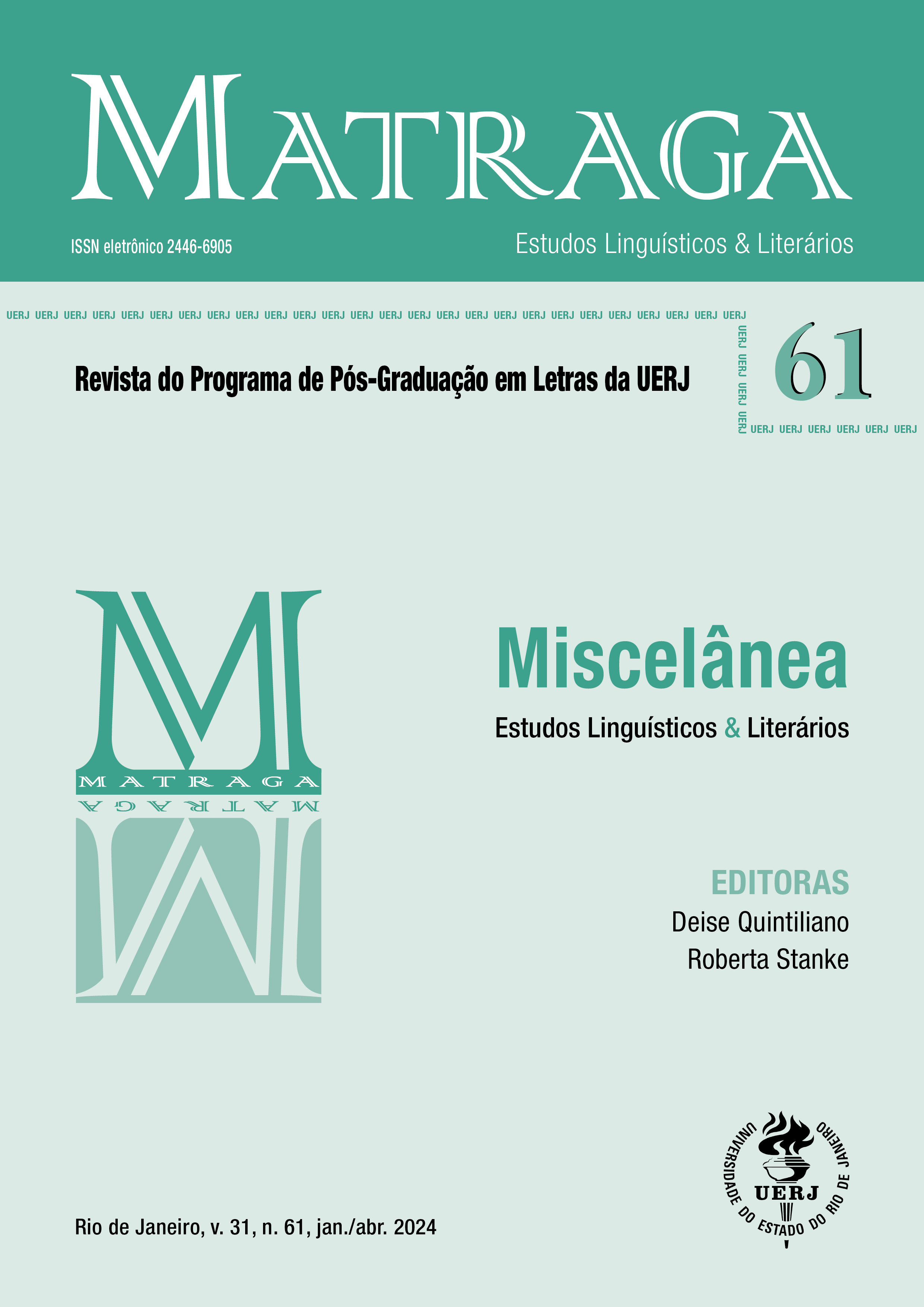The negotiation of discourse objects in a polemical digital interaction on Twitter
DOI:
https://doi.org/10.12957/matraga.2024.77338Keywords:
Referencing, Digital interaction, Modality polemic, TwitterAbstract
This work aims to investigate how interlocutors negotiate discourse objects or referents in a polemical digital interaction on Twitter. The Corpus is constituted of answers from users of the aforementioned social network to a tweet of Folha de S. Paulo profile that conveys news about the use of neutral language by Lula’s government. To reach the intended aim, we used the theoretical contributions of some authors, including: Amossy (2020), Cavalcante et al. (2020) and Macedo (2018), to approach the theoretical bases of the Theory of Argumentation in Discourse and its interface with Textual Linguistics; Amossy (2017), to deal with the modality polemic in argumentation; and Mondada and Dubois (2003), Custódio Filho (2011) and Cavalcante, Custódio Filho and Brito (2014), to discuss the phenomenon of referencing. Our analysis has revealed that the modality polemic configuration passes directly through the way interlocutors conflictingly negotiate the more salient referents in the interaction. It’s been confirmed, thus, the usefulness of the interface between Textual Linguistics and Theory of Argumentation in Discourse.
Downloads
References
AMOSSY, Ruth. O lugar da argumentação na análise do discurso: abordagens e desafios contemporâneos. Filologia e Linguística Portuguesa, n. 9, p. 121-146, 2007.
AMOSSY, R. As modalidades argumentativas do discurso. In: LARA, C. M. P.; MACHADO, I. L.; EMEDIA¬TO, W. (Orgs.). Análises do discurso hoje. v. 1. Rio de Janeiro: Nova Fronteira, 2008. p. 231-254.
AMOSSY, Ruth. Argumentação e Análise do Discurso: perspectivas teóricas e recortes disciplinares. Trad. Eduardo Lopes Piris e Moisés Olímpio Ferreira. EID&A – Revista Eletrônica de Estudos Integrados em Discurso e Argumentação, Ilhéus, n. 1, p. 129-144, jun./nov. 2011.
AMOSSY, R. Apologia da polêmica. Trad. de Mônica Cavalcante et al. São Paulo: Contexto, 2017.
AMOSSY, Ruth. A argumentação no discurso. São Paulo: Contexto, 2020.
CAVALCANTE, M. M.; CUSTÓDIO FILHO, V.; BRITO, M. A. P. Coerência, referenciação e ensino. São Paulo: Cortez, 2014.
CAVALCANTE, M. M. Abordagens da argumentação nos estudos de Linguística Textual. ReVEL, ed. espe¬cial, v. 14, p. 106-124, 2016.
CAVALCANTE, M. M; BRITO, M. A. P. O caráter naturalmente recategorizador das anáforas. In: AQUINO, Z. G. O.; GONÇALVES-SEGUNDO, P. R (org.). Estudos do discurso: caminhos e tendências. São Paulo: Paulistana, 2016. p. 119-133.
CAVALCANTE, M. M. et al. Linguística Textual e argumentação. Campinas: Cortez, 2020.
CAVALCANTE, M. M. et al. Linguística Textual: conceitos e aplicações. Campinas: Pontes, 2022.
CUSTÓDIO FILHO, V. Múltiplos fatores, distintas interações: esmiuçando o caráter heterogêneo da refe¬renciação. 2011. 331p. Tese (Doutorado em Linguística) – Universidade Federal do Ceará, Fortaleza, 2011.
CUSTÓDIO FILHO, V. Rediscutindo o princípio de construção negociada dos objetos de discurso. Revista de Letras, Fortaleza, v. 2, n. 36, p. 63-77, jul./dez.2017.
MACEDO, P. S. A. Análise da argumentação no discurso: uma perspectiva textual. 245 f. Tese (Doutorado em Linguística) – Universidade Federal do Ceará, Programa de Pós-graduação em Linguística, Fortaleza, 2018.
MARCUSCHI, L. A. Produção textual, análise de gêneros e compreensão. São Paulo: Parábola Editorial, 2008.
MONDADA, L.; DUBOIS, D. Construção dos objetos de discurso e categorização: uma abordagem dos pro¬cessos de referenciação. Trad. Mônica Magalhães Cavalcante. In: CAVALCANTE, M. M.; RODRIGUES, B. B.; CIULLA, A. (Orgs.). Referenciação. São Paulo: Contexto. 2003, p. 17-52.
Downloads
Published
How to Cite
Issue
Section
License

This work is licensed under a Creative Commons Attribution-NonCommercial 4.0 International License.
Authorization
Matraga – Scientific Journal of the Post-graduate Program in Arts and Humanities of UERJ is authorized to publish the article submitted here, if it is accepted for online publication. It is attested that the contribution is original, that it is not being submitted to another publisher for publication, and that this statement is the expression of truth.
The works published in Matraga's virtual space – Scientific Journal of the Post-graduate Program in Arts and Humanities of UERJ will be automatically transferred, and your copyright is reserved to Matraga. Its reproduction, in whole or in part, is conditional on the citation of the authors and the data of the publication.

Matraga uses license Creative Commons - Attribution-Non-Commercial 4.0 International.





